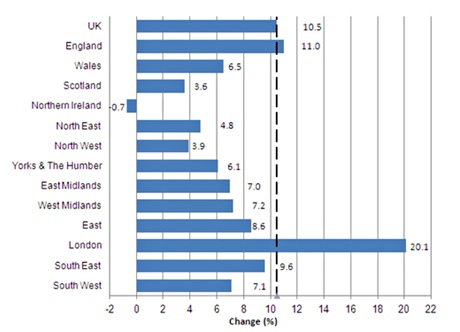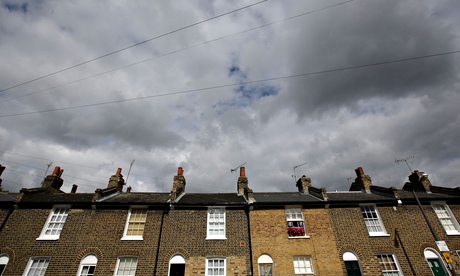Rising house prices and high levels of household debt could tip the UK back into recession if left unchecked, the Bank of England governor has warned.
Mark Carney told MPs on the Treasury select committee that the threat of a property bubble was the "biggest risk" to economic recovery over the medium term, as official figures showed house prices rose by 10.5% in the year to May – and more than 20% in London.
Outlining in detail why the Bank's financial policy committee made the decision last month to limit the proportion of high loan to income mortgages granted by lenders, he said that a proliferation of highly indebted households could tip the economy back into recession.
 Source: Office for National Statistics
Source: Office for National Statistics
Carney said that as house prices rise, individuals become increasingly overstretched financially in order to afford to buy a house, prompting them to cut spending on other things.
"What we were trying to address was the indirect risk from indebtedness ... and the macroeconomic consequences of that. Because history shows British people pay their mortgages, there are very low default rates on mortgages. What happens if households are borrowing at high multiples is they have to economise on everything else in order to pay their mortgages.
"And if enough people are highly indebted, that has a big macroeconomic impact. It can tilt the economy back into recession, and we start from a position of vulnerability. There is the possibility that currently responsible lending standards become irresponsible to reckless."
Carney said the FPC had decided to prevent lenders from extending more than 15% of their mortgages to customers needing to borrow four-and-a-half times their income as an "insurance" policy against a dangerous rise in high loan to income mortgages.
His comments were made as figures from the Office for National Statistics (ONS) showed the average house price paid by first-time buyers has pushed through the £200,000 mark for the first time.
The data, which is based on figures from mortgage lenders, showed prices increased strongly across the regions, although London continued to outstrip the rest of the country with a record annual increase of 20.1%.
The average price of a property in the capital is now £492,000 – just £8,000 short of the 4% stamp duty threshold.
Across the UK, the annual rate of inflation was the highest for four years and up from the 9.9% recorded in April.
However, once price increases in London and the south-east are stripped out, the ONS said the annual increase across the UK was 6.5% in May. The average cost of a UK home reached £262,000, or £200,000.
Prices have risen more quickly for first-time buyers than for those moving home, going up by 11.3% over the year to an average of £202,000. Owner-occupiers witnessed house-price inflation of 10.1% over the same period and paid an average of £301,000 to move.
Duncan Stott, director of PricedOut, the campaign for affordable house prices, said: "It is crazy that ordinary working people are having to pay so much for something as fundamental in life as a home. With over £200,000 needed to secure a first home, young people will now be saying, 'enough is enough'.
"The housing market is the biggest threat to economic stability, so it is simply reckless of the government to allow house prices to rampage so far out of reach. We need urgent action to bring an end to rising house prices."
The ONS figures showed that during the year to May average house prices increased by 11% in England, 6.5% in Wales and 3.6% in Scotland but fell 0.7% in Northern Ireland.
Campbell Robb, chief executive of the housing charity Shelter, said house prices were "spinning out of control".
"With interest rates at historic lows, it is worrying that taking on huge mortgages is becoming a tempting option, and something that could have disastrous repercussions," he said.
"The government has to start meeting people halfway by committing to building the homes that they can afford. From a new generation of part-rent, part-buy homes, to encouraging smaller builders back into the market, we know that this is possible. Now we need to see action that will bring an affordable home back within reach."


